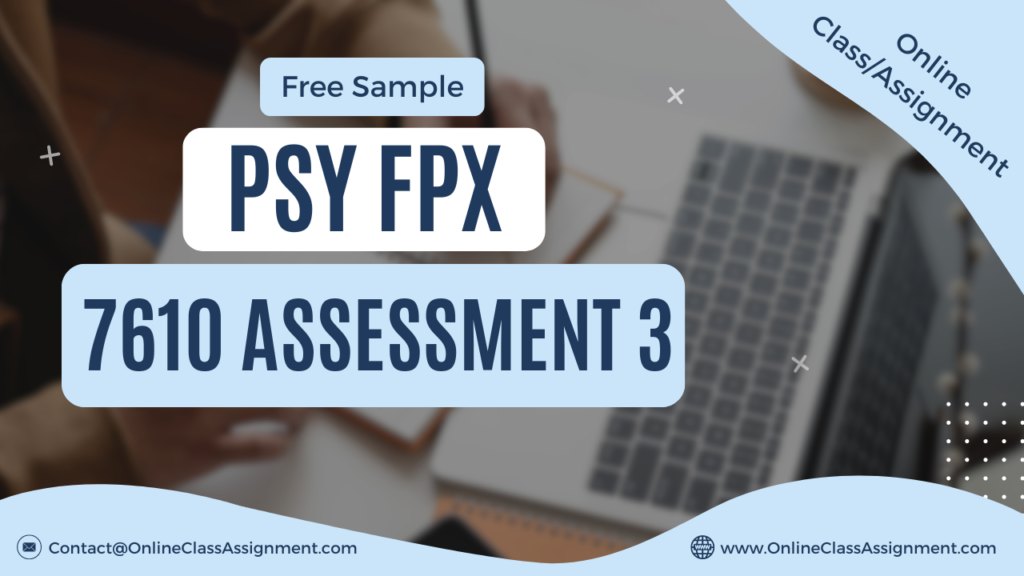PSY FPX 7610 Assessment 3 Evaluation of Test Materials

PSY FPX 7610 Assessment 3 Evaluation of Test Materials
Student Name
Capella University
PSY FPX 7610 Tests and Measurements
Prof. Name
Date
Introduction
Personality tests are valuable tools for athletes and coaches, aiding in self-awareness and behavior refinement, ultimately enhancing performance. Standardized tests like the 16 Personality Factors (16PF), the Minnesota Multiphasic Personality Inventory (MMPI), and the NEO Personality Inventory assess personality but operate on different levels. For instance, the MMPI focuses on personality traits and psychopathology, the NEO measures emotional and motivational styles based on the five-factor model, while the 16PF evaluates sixteen personality traits predicting behavior across various situations (Reardon & Factor, 2010).
Furthermore, these tests are useful in identifying psychological disorders among athletes, such as depression and anxiety. While “normal state anxiety” is common before competitions, major depressive disorder can lead to a disinterest in previously enjoyable activities. Regular administration of personality tests can help mitigate the risk of athletes succumbing to psychological disorders (Reardon & Factor, 2010).
Evaluation of Test Materials, Costs, and Administration Times
| Test | Materials Required | Costs | Administration Time |
|---|---|---|---|
| 16PF | Test booklets, answer sheets, pencils (manual or computer) | $100 (administering) | 35–50 mins (paper), 25–35 mins (computer) |
| NEO Personality Inventory | Test booklets, answer sheets, scoring keys, profile forms | $55 (complete kit), $195 (computer version) | 30–40 mins (test), 15 mins (scoring) |
| MMPI | Test booklets, answer sheets, profile forms, scoring keys | $535.25 (Adolescent Restricted Form kit) | 60–90 mins |
The MMPI is widely used in psychological assessments, particularly in collegiate counseling centers, and is relevant in identifying psychological issues prevalent among athletes (Salkind, 2007).
Evaluation of Scoring Procedures and Interpretation Guidelines
The NEO Personality Inventory utilizes a Five Factor Model, scoring traits on a 1 to 5 scale and comparing responses with population norms to provide insights into personality domains and stability levels. Similarly, the MMPI’s booklet-style answer sheet allows hand-scoring, offering insights into various scales, including energy levels and emotional functioning (Rosellini & Brown, 2011).
Evaluation of Test Technology
While computerized scoring for the 16PF may yield inconclusive results, trained professionals ensure accurate interpretation by integrating multiple data sources. Likewise, the MMPI-2 utilizes specialized software for scoring, emphasizing the need for trained psychologists in result interpretation (“How to Score the MMPI-2”).
Conclusion
Regular administration of personality tests throughout the sports season aids in monitoring athletes’ mental health and understanding their evolving attitudes and behaviors. Familiarity with test processes and benefits enhances their integration into coaching practices, fostering a supportive environment for athlete well-being.
References
Botwin, M., & Juni, S. (1995). Revised NEO Personality Inventory. The Twelfth Mental Measurements Yearbook.
Carrington-Rotto, P., & McLellan, M. J. (1995). Sixteen Personality Factor Questionnaire, Fifth Edition. The Twelfth Mental Measurements Yearbook.
PSY FPX 7610 Assessment 3 Evaluation of Test Materials
Floyd, A. E. (2023, April 24). Minnesota Multiphasic Personality Inventory. StatPearls – NCBI Bookshelf.
Hess, A. K., & Widiger, T. A. (1992). NEO Personality Inventory. The Eleventh Mental Measurements Yearbook.
“How to Score the MMPI-2.” (2023, May 15). SportsRec.
Psych Press. (n.d.-b). NEO PI-R | Psych Press.
Reardon, C. L., & Factor, R. M. (2010). Sport psychiatry: A Systematic Review of Diagnosis and Medical Treatment of Mental Illness in Athletes. Sports Medicine, 40(11), 961-980.
Rosellini AJ, Brown TA. The NEO Five-Factor Inventory: latent structure and relationships with dimensions of anxiety and depressive disorders in a large clinical sample. Assessment, 18(1), 27-38.
Salkind, N. J. (Ed.) (2007). . (Vols. 1-0). Sage Publications, Inc.
PSY FPX 7610 Assessment 3 Evaluation of Test Materials
Stein, S. (2021). Minnesota Multiphasic Personality Inventory–Adolescent–Restructured Form. The Twenty-First Mental Measurements Yearbook.
Get Capella University Free MS Psychology Samples
PSY FPX 5002
PSY FPX 6710
- PSY FPX 6710 Assessment 6 Training Evaluation
- PSY FPX 6710 Assessment 5 Virtual Excellence
- PSY FPX 6710 Assessment 4 Intervention Proposal to Address
- PSY FPX 6710 Assessment 3 East Assignment Coaching Plan
- PSY FPX 6710 Assessment 2 Proposal for Conducting Candidate Screens
- PSY FPX 6710 Assessment 1 I/O Scholar Practice Gap
PSY FPX 5110
PSY FPX 6720
- PSY FPX 6720 Assessment 6 Human Resources Strategic Plan for Leadership Development
- PSY FPX 6720 Assessment 5 Critical Analysis of Leadership Theories
- PSY FPX 6720 Assessment 4 Leader Development
- PSY FPX 6720 Assessment 3 Self-Leadership
- PSY FPX 6720 Assessment 2 The Importance of Leadership and Diversity
- PSY FPX 6720 Assessment 1 The Importance of Leader Values, Traits, and Context
PSY FPX 6730
- PSY FPX 6730 Assessment 6 Growth and Development
- PSY FPX 6730 Assessment 5 Case Study: Implementation
- PSY FPX 6730 Assessment 4 Theoretical Foundations
- PSY FPX 6730 Assessment 3 Consultation Discovery Process
- PSY FPX 6730 Assessment 2 Entry and Contracting: A Case Study Description
- PSY FPX 6730 Assessment 1 Entry and Contracting: Analysis of ABC Bank
PSY FPX 6740
- PSY FPX 6740 Assessment 5 Ethical and Legal Aspects of I-O Psychology
- PSY FPX 6740 Assessment 4 Planning
- PSY FPX 6740 Assessment 3 Human Resource Development and Training, A Case Study
- PSY FPX 6740 Assessment 2 Values and Diversity
- PSY FPX 6740 Assessment 1 Psychological Foundations in Human Resources and Personnel
PSY FPX 7610
PSY FPX 6O15
